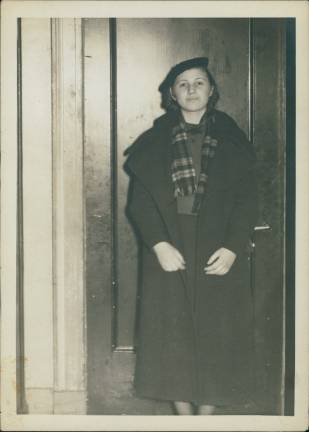my mother the socialist

On May Day, I had the thrill of seeing my mother, Estelle M. Horowitz, honored at an exhibit of labor leaders of New York at the Museum of the City of New York. Estelle had been an unabashed young socialist in the 1930s, a time when she and countless other New York City children of Jewish immigrants yearned for something better. I saw photos of my mother I had long forgotten, along with her blue denim work shirt, with its red Young Socialist insignia on the pocket. That shirt, which she wore nearly ninety years ago, had nearly ended up in the garbage heap, until I realized it was an uncannily well-preserved slice of history, as well as a tribute to an extraordinary life.
Estelle, who died a few years ago at age 96, was a member of the Young People’s Socialist League (YPSL) in New York City when the U.S. socialist movement was at its fervent peak. Her involvement — idealistic and passionate — set her on a path for life. My mother became a college economics professor, then a union organizer at her college and finally, the head of the United Federation of College Teachers (UFTC). When my family attended the exhibit, one of her former colleagues turned to my daughter and said: “Your grandma saved my job!”
Like many in the 1930s, my mother’s interest in socialist causes started early, in her case, preternaturally so. She was just 12 and living in Yorkville, the German/Hungarian enclave on Manhattan’s Upper East Side, when the charismatic pull of Norman Thomas, the former Presbyterian Minister and perennial Socialist candidate for President, lit up a passion in her. This was the Depression, and my mother’s father, a Yorkville tailor, was seeing his wealthy East Side clients less and less able to afford his custom-made suits. Thomas, meantime, a “silver tongued” orator, as his Princeton classmates put it, tall, imposing, and dressed in three-piece suits, would rouse the crowds downtown like the best of them.
The young Estelle traveled from her home in Yorkville to hear Thomas exhort the throng to bring on change for workers beaten down by filthy conditions, subsistence level wages and little job security. It didn’t take long before this 12-year-old was standing on street corners handing out leaflets in support of the International Ladies’ Garment Workers Union (ILGWU). Within a couple of years, Estelle was a full-throttle member of the YPSL and routinely attended Thomas’s rallies, wearing her YPSL shirt with pride.
Decades later, in the 1970s, my mother, by then an economics professor at Pratt Institute, organized the Pratt faculty into a union. Even having become a professor was a feat in itself. Her parents had forbidden her to go to college, saying that if anyone in the family should go, it was her big-brained brothers, not a girl like her, no matter how smart she was. To get there, she forged her mother’s signature on the application and somehow convinced the local pharmacist to notarize it without ever witnessing her mother sign.
At Pratt, Estelle negotiated the Institute’s first collective bargaining agreement for the faculty, making it possible for professors to attain a decent wage, along with robust benefits and job security through tenure. She also accomplished something radical for the time: she won for part-timers the same health benefits and chance for tenure as full-timers. From Pratt, Estelle was able to help other professors nationwide as head of the UFTC.
Back in her YPSL days, as the Depression wore on, Estelle’s family was forced to move from their Yorkville brownstone, first to East Harlem and then to the Bronx. It was in the Bronx where Estelle and her fellow YPSLs would eat blintzes at Brighton Cafeteria on Simpson Street and exchange whatever news they picked up. They picketed for the ILGWU, the belt and leather workers, and sometimes, my mother said, they would wind up at far-flung storefronts they’d never seen before.
Eventually, Norman Thomas’s rallies ebbed and my mother’s affiliation as a YPSL ended.
But one day, decades after she first met him, Norman Thomas came to speak at Pratt, a tremendously moving moment for my mother. By this time, Thomas was suffering from crippling arthritis, and his eyesight and hearing were failing, but he still kept up his speaking schedule. He made a joke of his ailments: slowly reaching the podium, he said to his audience, “Creeping socialism!” I can just hear my mother responding back: “Creep On!”
The exhibition at the Museum of the City of New York — “City of Workers, City of Struggle: How Labor Movements Changed New York” — runs through Jan 5, 2020.www.mcny.org/exhibition/city-workers-city-struggle